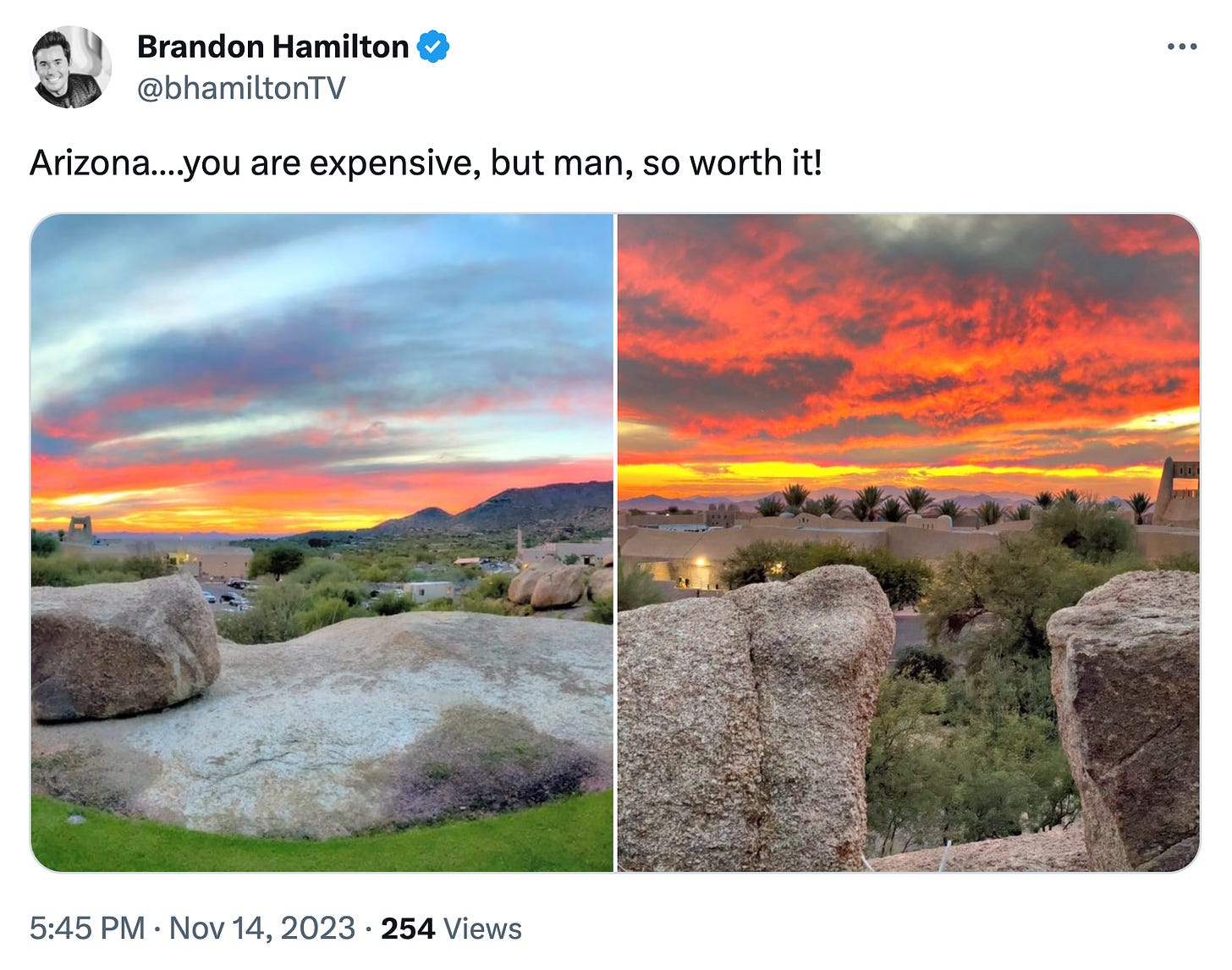The Daily Agenda: Speak freely
Free speech is just hate speech you agree with ... Cowboy hats, water and life are expensive ... And chicken poop bingo!
Arizona’s public universities regularly host speakers and groups that poison students’ brains, spew hate speech, promote anti-American ideologies and have a lot in common with Nazis.
Both sides agree on that much.
But they disagree on which speakers they’re describing — is it conservative talk show host Dennis Prager and groups like Turning Point USA, or is it Minnesota Congresswoman Rashida Tlaib and groups like Students for Justice in Palestine that are promoting the hate speech?
During yesterday’s hearing about the state of free speech at Arizona’s universities, Republicans argued that free speech is under attack, a message that was inadvertently underscored by several of the speakers who urged lawmakers to round up and prosecute students associated with pro-Palestine groups that lawmakers called terrorist organizations.
Democrats, meanwhile, bailed on the hearing, saying after July’s committee meeting lasted more than five hours and “provided no discernable value to the public,” they were skipping today’s “grandstanding, divisive” meeting.
If you haven’t been following along, the free speech debate at Arizona State University has been escalating in recent months and it’s spilling over to the Capitol. There are two storylines you need to understand here: the alleged censorship of conservatives and the alleged censorship of liberals.
The alleged conservative censorship
Started back in February, when a group of ASU faculty members sent a letter to ASU protesting an event featuring Turning Point USA founder Charlie Kirk, Prager, the talk show host, and “Rich Dad, Poor Dad” author Robert Kiyosaki, calling them “white-nationalists,” anti-LGBTQ and election and Covid deniers (or in the case of Kiyosaki, just a general huckster).
The event still happened.
Republican lawmakers set up the free speech committee to investigate whether students’ free speech rights were violated.
An outside investigation of ASU’s handling of the Turning Point event found no wrongdoing.
The main donor for the speaking series was so upset by the faculty's reaction that he pulled his funding for the program.
The program’s executive director wrote in the Wall Street Journal that she was being fired for organizing the event.
Kirk spoke at ASU again in September.
A film crew from Turning Point harassed a queer professor on campus last month, leading ASU President Michael Crow to condemn the group.
The alleged liberal censorship
Began in October as the Israel-Gaza conflict escalated and pro-Palestinian groups organized protests on ASU’s campus and chanted anti-Israel slogans.
Earlier this month, Students for Justice in Palestine protested the ASU student government meeting, throwing rocks at the window and leading Crow to denounce antisemitism and intimidation of students.
Most recently, ASU canceled a planned appearance from U.S. Rep. Rashida Tlaib, who has been censured by the U.S. House for “calling for the destruction of the state of Israel.” Lawmakers protested her appearance on campus, and ASU nixed the event, saying it wasn’t properly registered.
All of which leads us to today’s hearing, where lawmakers called ASU staff “Gestapo,” repeatedly derided Crow as an ivory tower elitist who thinks he’s smarter than the Founding Fathers, and spent an awful lot of time fixating on the university’s LGBTQ class offerings.
Lawmakers heard from Tom Lewis, the ASU donor who yanked his funding for his namesake T.W. Lewis Center for Personal Development after the February event drama. Without his money, ASU eliminated the whole center and associated positions, leading to the Wall Street Journal op-ed. They heard from Linda Blake, an events coordinator who was terminated from ASU after Lewis pulled back his funding. And they heard from Brett Johnson, the lawyer ASU hired to investigate any wrongdoing.
It could have been an interesting discussion about where to draw the line on university campuses, and Johnson’s testimony briefly veered into that territory. But lawmakers kept dragging him back to the real point of the meeting: bashing ASU’s liberal leadership.
“They're indoctrinated by the faculty who keep pouring these this garbage into their young minds of they’re haters, homophobic, anti-education, they attack women, they're bigoted, white nationalist, anti-democracy, election deniers, COVID deniers, J-six deniers, all that stuff is fishy, especially the COVID stuff,” Republican Sen. Sonny Borrelli told Johnson, before adding that “more evidence is coming out about January 6.”
Yesterday’s panel went about as expected: There was a lot of outrage and platitudes, zero solutions and not a single mind changed. We expect to see more than one bill on college free speech in the upcoming legislative session, and we expect to see those bills vetoed. And that’s probably for the best.
There’s an interesting and necessary discourse to be had about the line between controversial political speech and hate speech, and where to draw that line on university campuses. But that discussion should be had in the halls of academia, among students and professors who have to live with the toxic atmosphere controversial speakers on campus can create — not the halls of the Arizona State Capitol, among those who create and profit off that toxic atmosphere.
Unintended consequences: The short-term deal between Arizona, California and Nevada to conserve their Colorado River water allocations will likely make water more expensive as the value of existing federal contracts with farmers and tribes has increased by up to 50%, Politico reports. The $1.2 billion in drought funding used to incentivize the current agreement could make future conservation deals more expensive, while most of Arizona’s conserved water will come from those with the greatest risks of losing water allocations when cuts come in the future: cities, tribes and industrial users.
“It’s all a grand experiment,” Kathryn Sorensen, a former head of Phoenix’s water department, said. “This market, especially one with a premium [price], might create some perverse incentives.”
Cowboy hats are expensive: The Federal Election Commission is asking Pinal County Sheriff and U.S. Senate candidate Mark Lamb why his campaign spent almost $28,000 on campaign attire, Roll Call’s Chris Marquette reports. Lamb made five separate purchases from a vendor called Revi, and the FEC is suspicious the expenditures are illegal personal uses of campaign funds.
The fungi fund: The application window to receive a grant to study psilocybin mushrooms, thanks to a $5 million allocation the Arizona Legislature approved last year, will open in about a month, per KJZZ’s Tom Maxedon. The money is intended for research institutions to examine how magic mushrooms can treat health issues like post-traumatic stress disorder, depression and seizures.
Proactive pushback: Most Phoenix City Council members aren’t keen on signing an agreement with the U.S. Department of Justice when it releases its civil rights investigation of the city’s police department, per the Republic’s Taylor Seely. Cities typically sign on to agreements with the feds to monitor their police departments after such reports, and if Phoenix turns down the agreement, it would be the largest city to resist Justice Department-issued police reforms while likely starting a costly legal battle.
"They’re hoping Phoenix will roll over and sign on to a consent decree — effectively relinquishing control of our department to them," Phoenix Council Member Ann O'Brien wrote in an op-ed for the Republic.
Airbnb antidote: Sedona is hoping to quell the prevalence of short-term rentals — which make up one in six homes in the city — by providing optional deed restrictions that allow homeowners to prevent their properties from becoming short-term rentals, KJZZ’s Michel Marizco reports.
From “draconian cuts” to “budget controls”: After warning of “draconian” cuts ahead, University of Arizona President Robert Robbins said he won’t impose furloughs, cut retirement benefits for staff nor reduce need-based financial aid for students as the UA faces financial woes with $240 million in unaccounted for funds, the Star’s Ellie Wolfe reports. Robbins told staff in an email that “the university is not in financial jeopardy,” but “new budget controls must be implemented to prevent deficit spending in the future.”
Please don’t make us institute “budget controls” ahead of the busy election season. Click this button to ensure the Agends remains “not in financial jeopardy.”
Being alive is expensive: Phoenix’s cost of living is higher than the national average, but just by about 2 points, per an index compiled by the Council for Community and Economic Research, Axios’ Jeremy Duda reports. Phoenix‘s housing costs are 12 points above the national average, while Lake Havasu City came out as the state’s most expensive city and Bullhead City the cheapest.
Words have consequences: The future of the Arizona Military Museum remains uncertain after a visitor raised concerns about comments from Director Joe Abodeely,1 who allegedly told his tour group: “Eventually they will replace me with some Gay, Black, Woman, woke Jew who will ruin the place,” the Republic’s Stacey Barchenger reports. Abodeely’s comments led to the eventual shuttering of the museum, and Maj. Gen. Kerry Muehlenbeck, the adjutant general of the Arizona National Guard, decided to cut ties with the nonprofit operating it.
Pill quid pro quo: The Arizona Attorney General’s Office is suing pharmaceutical manufacturers for allegedly overcharging for insulin, 12News’ Kevin Reagan reports. The lawsuit outlines a scheme in which manufacturers issued quid pro quo payments to pharmacy benefit managers to get favorable placement on health insurance plans.
In land we trust: Gilbert will use $1.5 million from a Community Land Trust to build energy-efficient, affordable housing, per KTAR’s Damon Allred. Developers will sell homes, but not the trust-retained land they're built on, at below-market prices.
Tucson bingo aficionados now have a more entertaining option: Chicken poop bingo, where the numbers are picked based on where chicken poop falls, per Riley Brown, who got the scoop for the University of Arizona’s El Inde.
It’s not just a game of chance.
“If you are strategic to how you are feeding them you can try to get their butts closer to your number,” Jess Luse, who runs the chicken bingo program, explained.
And as long as we’re keeping with the Tucson animal theme, here’s one more.
For a fun rabbit hole on how Abodeely got lawmakers to erect a monument to fake news in the Vietnam War era, check out this story, which actually served as the inspiration for our quest to erect a monument honoring murdered journalist Don Bolles.











So, the GOP position is that Free Speech applies only to those with whom they agree?
As the article notes, issues of who should be invited to speak at a university should be left to the university community itself; having a contentious, sometimes raucous debate is a long tradition in academia. Government should stay out of it, and you'd think the "small government" proponents would want that. As it says in the U.S. Constitution's 1st amendment, "Congress shall make no law ... abridging the freedom of speech" , which should serve as a model for states as well.